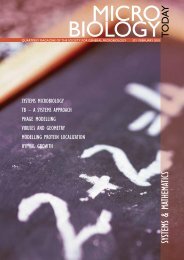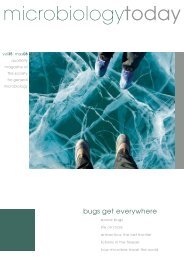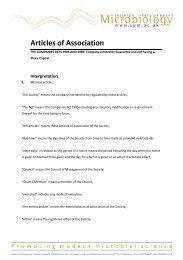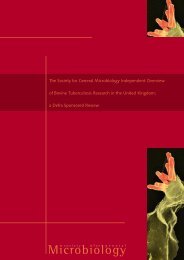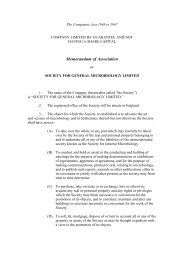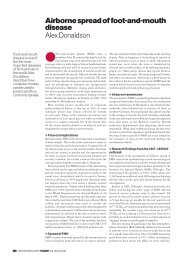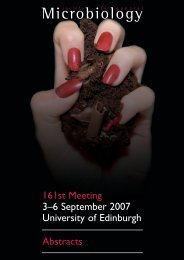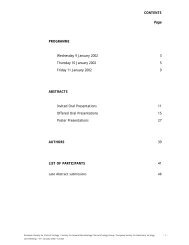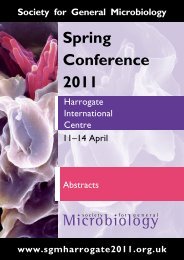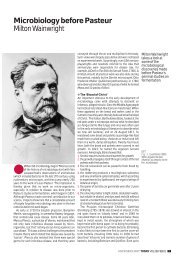Download - Society for General Microbiology
Download - Society for General Microbiology
Download - Society for General Microbiology
Create successful ePaper yourself
Turn your PDF publications into a flip-book with our unique Google optimized e-Paper software.
Nobel Prize<br />
in Physiology<br />
or Medicine<br />
2008<br />
This year’s Nobel Prize<br />
rewards the discoveries<br />
of two viruses causing<br />
severe human diseases.<br />
One half will go to Harald<br />
zur Hausen (German<br />
Cancer Research Centre,<br />
Heidelberg, Germany)<br />
<strong>for</strong> his discovery of<br />
human papilloma viruses<br />
causing cervical cancer.<br />
The other half will be<br />
shared between Françoise<br />
Barré-Sinoussi (Institut<br />
Pasteur, Paris, France) and<br />
Luc Montagnier (World<br />
Foundation <strong>for</strong> AIDS<br />
Research and Prevention,<br />
Paris, France) <strong>for</strong> their<br />
discovery of human<br />
immunodeficiency virus.<br />
See the article by Robin<br />
Weiss on p. 192.<br />
2008<br />
Address Book<br />
A copy of the latest edition<br />
of the <strong>Society</strong>’s Address<br />
Book, giving contact details<br />
of members, should have<br />
been enclosed with your<br />
mailing of this magazine.<br />
If you did not receive one,<br />
please get in touch with<br />
the Membership Office<br />
(members@sgm.ac.uk).<br />
SGM Staff<br />
Council – new structure<br />
A Special Resolution to amend the <strong>Society</strong>’s Articles of Association was passed at the<br />
AGM on 9 September 2008. This will enable implementation of the changes to the SGM’s<br />
governing Council that were described on p. 106 of the August issue of <strong>Microbiology</strong><br />
Today. With effect from the AGM to be held in 2009, Council will consist of six Officers<br />
and the number of Ordinary Members will be reduced to six over the period from then<br />
to September 2011. Much of the business will be transacted by subcommittees. The new<br />
Articles are available on the website at www.sgm.ac.uk/about/articles.pdf<br />
Council – July meeting highlights<br />
The SGM Prize Medal<br />
Council devoted a significant amount of<br />
time to careful consideration of nominations<br />
<strong>for</strong> the new SGM Prize Medal to be<br />
awarded in 2009. It was agreed that the<br />
President should approach Dr Stanley<br />
Prusiner and he has been pleased to accept<br />
(see p. 159). A more detailed appreciation<br />
of Dr Prusiner’s work will be published in<br />
a future issue of <strong>Microbiology</strong> Today.<br />
Honorary Membership<br />
Council has bestowed Honorary<br />
Membership of the <strong>Society</strong> on Dr Volker<br />
ter Meulen, Professor Emeritus <strong>for</strong> Virology<br />
and Immunology, Universität Würzburg, and<br />
President of the ‘Leopoldina’, Gesellschaft<br />
für Natur<strong>for</strong>scher und Ärzte, Sachsen-<br />
Anhalt, in recognition of his outstanding<br />
contributions to the molecular biology of<br />
paramyxo- and coronaviruses and chronic<br />
virus–host relationships, as well as <strong>for</strong> his<br />
engagement in SGM activities, science<br />
management and international microbiology<br />
promotion.<br />
Professor Sir Howard Dalton<br />
Council was pleased to hear that SGM had<br />
been remembered in the will of <strong>for</strong>mer<br />
President, the late Professor Sir Howard<br />
Dalton FRS. The bequest of £2,000 will be<br />
used to promote microbiological projects<br />
in The Gambia where Sir Howard and his<br />
wife Kira carried out charitable work.<br />
SGM finances<br />
Council approved the membership fees<br />
and SGM journal subscription prices <strong>for</strong><br />
2009. These will increase by on average<br />
4%.<br />
Laboratory-based microbiology<br />
projects <strong>for</strong> medically qualified<br />
graduates<br />
The Treasurer announced that there will be<br />
a new grant scheme to support medically<br />
qualified graduates taking up a career in<br />
medical microbiology. The grants will fund<br />
the consumables part of short-term research<br />
projects in a ‘home’ hospital or another host<br />
laboratory. Applications to the scheme are<br />
invited <strong>for</strong> 2009; see www.sgm.ac.uk/<br />
grants<br />
Retiring members of Council<br />
The President thanked the retiring<br />
member of Council, Professor Bert<br />
Rima, Queen’s University, Belfast, <strong>for</strong> his<br />
highly appreciated input to the activities<br />
of Council. He also noted the significant<br />
contributions of Professors Iain Hagan<br />
and Rick Randall, who had resigned from<br />
Council earlier in the year, be<strong>for</strong>e the end<br />
of their terms of office.<br />
Ulrich Desselberger, <strong>General</strong> Secretary<br />
Congratulations to Stefan Sidorowicz and his wife Helen on the birth of a baby daughter Laura in July, and to Nicolas<br />
Fanget and his wife Amina on the birth of a baby son Bilal in October.<br />
Farewell to Gemma Sims who worked here <strong>for</strong> a year to develop a microbiology teaching resource to meet the<br />
requirements of the new A levels. This should be ready <strong>for</strong> distribution to UK schools early in 2009. We wish Gemma well<br />
in her new post as teacher of biology at Leighton Park School in Reading.<br />
New elected members of Council<br />
The following will serve on Council <strong>for</strong> 4 years from 9 September 2008:<br />
Professor Mark Harris<br />
I graduated with a first class honours degree in Biological Sciences from Plymouth Polytechnic in<br />
1983 and then undertook my PhD at the Institute of Virology in Glasgow, working with Ron Hay on<br />
adenovirus DNA replication. After a postdoc at the NERC Institute of Virology in Ox<strong>for</strong>d working on<br />
baculoviruses with Bob Possee, I moved back to Glasgow to the Department of Veterinary Pathology,<br />
switched from DNA to RNA viruses, and began working on the Nef protein of HIV-1 in the lab<br />
of Jim Neil. After 5 years as a postdoc I obtained an MRC Senior AIDS Research Fellowship and<br />
subsequently moved to Leeds in 1997, taking up a Lectureship post in what was then the Department<br />
of <strong>Microbiology</strong>. Whilst retaining an interest in HIV, my lab has moved over almost entirely to the<br />
study of hepatitis C virus. My research is focussed both on basic mechanisms of virus replication as<br />
well as virus–host protein interactions. Our funding comes from a variety of sources including research<br />
councils, the Wellcome Trust and industry. I have always been a strong supporter of the <strong>Society</strong> – I am<br />
currently an Editor of Journal of <strong>General</strong> Virology and serve on the Virus Division committee. I welcome<br />
the opportunity to make a further contribution to SGM activities as a member of Council.<br />
Dr Gary Rowley<br />
Gary Rowley is a lecturer of bacterial pathogenesis within the School of Biological Sciences, University<br />
of East Anglia. He did his PhD with Professor Mark Roberts, University of Glasgow, and then moved<br />
to the Institute of Food Research, as a postdoc in Professor Jay Hinton’s Laboratory. He moved to UEA<br />
in 2007 to take up a Faculty position. His research interests focus on the environmental regulation of<br />
bacterial virulence genes using the intracellular pathogen Salmonella Typhimurium as a model organism.<br />
Recent work has focused on investigating the role of the envelope stress response in pathogenesis and<br />
the mechanisms that Salmonella uses to detoxify nitric oxide.<br />
Congratulations to …<br />
SGM Education Officer Dr Sue Assinder on<br />
her appointment as Director of Education,<br />
Liverpool School of Tropical Medicine.<br />
Professor David Baulcombe (University of<br />
Cambridge) on winning the 2008 Albert<br />
Lasker Basic Medical Research Award. Along<br />
with Victor Ambros and Gary Ruvkun, the<br />
award honours the scientists who revealed<br />
an unanticipated world of tiny RNAs that<br />
regulate gene activity in plants and animals.<br />
Baulcombe made his discovery whilst<br />
probing how plants defend themselves<br />
against viruses.<br />
Professor Nigel L. Brown, <strong>for</strong>mer Director<br />
of Science and Technology at the BBSRC<br />
who has moved to the University of<br />
Edinburgh as Vice-Principal and Head of the<br />
College of Science and Engineering.<br />
Professor Iain Hunter (University of<br />
Strathclyde) on his new post as Dean of the<br />
University’s Faculty of Science. Professor<br />
Hunter has been Professor of Molecular<br />
<strong>Microbiology</strong> <strong>for</strong> the past 13 years.<br />
Professor Richard James (Head of the<br />
School of Molecular Medical Sciences,<br />
University of Nottingham) on being<br />
awarded the SfAM Communications Award<br />
2008 <strong>for</strong> raising the profile of his applied<br />
microbiology work to the public.<br />
Douglas Kell, Professor of Bioanalytical<br />
Science, University of Manchester, who<br />
is to be the new Chief Executive of the<br />
Biotechnology and Biological Sciences<br />
Research Council. He is a leading figure in<br />
the world of systems biology.<br />
Professor Hilary Lappin-Scott (University of<br />
Exeter and SGM Scientific Meetings Officer)<br />
who will be taking up a new post at Bangor<br />
University in January 2009 as Pro Vice<br />
Chancellor <strong>for</strong> Research.<br />
Deaths<br />
The <strong>Society</strong> notes<br />
with regret the deaths of:<br />
Professor Peter Gilbert<br />
(University of Manchester),<br />
a distinguished expert on<br />
biofilms and a member<br />
since 1974. Professor<br />
Gilbert was due to speak at<br />
the recent SGM meeting in<br />
Dublin and the programme<br />
was changed so that<br />
Professor Michael Brown<br />
could deliver a tribute. A<br />
reception was also held to<br />
honour Peter’s memory.<br />
Professor Christopher<br />
Thurston, a member since<br />
1972, died in August after a<br />
long illness. A full obituary<br />
appears on p. 210.<br />
160 microbiology today nov 08<br />
microbiology today nov 08 161



